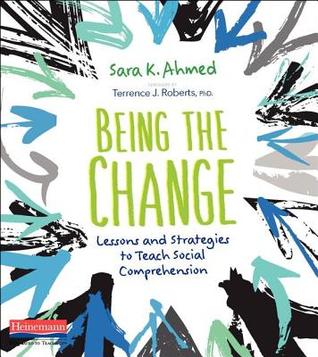Being the Change

Being the Change, by Sara K. Ahmed, is a book in dire need of a new subtitle. Lessons and Strategies to Teach Social Comprehension sounds like a book that teaches basic social skills. At first glance, I figured it was probably useful, but not a topic that skyrocketed to the top of my reading list.

Of course, Being the Change is so much more than that. While other texts focus primarily on improving student behaviour in the classroom, Sara K. Ahmed has a grander vision in mind. In our world, social issues are becoming increasingly more pressing. Questions relating to refugees and immigration, gun violence, racial discrimination, sexism and other societal problems are becoming more divisive. If we choose to ignore these issues, to put our heads in the sand, we are doing our students a great disservice. Ahmed writes:
"Without this space for dialogue and questions, or this reassurance that we will listen, we send the message to kids that they must keep carrying on. That they must keep their hearts buried by a flurry of stereotypes, media-generated hype, and tragic events. That they must keep their heads down. Blinders on. That they must work harder towards personal happiness and success without considering the effects we have on others in our world.
Because, frighteningly enough, that seems to be the message they're hearing from us." (page xxii)
To work towards social understanding in our society, we need to start addressing issues as they come up in our classrooms. To assist with this, Ahmed has compiled a variety of lessons that give students the tools to engage respectfully with each other. These include exploring our identities, learning to listen to each other, understanding bias, and investigating our shared humanity. Each section contains several mini-lessons, plus trouble shooting tips.
These lessons are useful as jumping off points for dealing with content that is often uncomfortable. Ahmed makes the point that discomfort can be an important part of the learning process, and I agree. She focuses on issues like the Muslim Ban in the United States, in part because of her personal connections to this topic. In my own Canadian context, the lessons she outlines would be particularly useful in discussing racism and indigenous issues. Units relating to indigenous issues and reconciliation often start with uncomfortable truths. Dealing with these truths can be hard, but also provide the biggest rewards in promoting a fairer, more inclusive, and more understanding society. Ahmed's lessons give teachers a framework for teaching skills to better help students deal with these serious issues.
